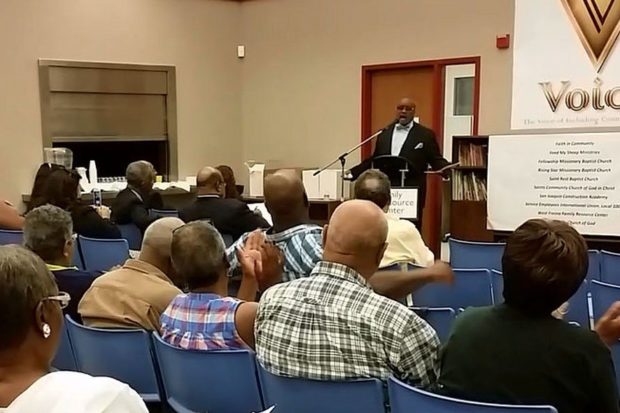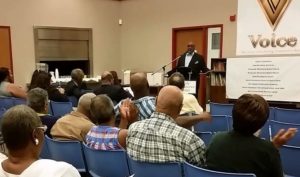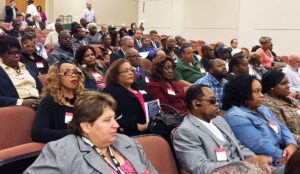
By Stan Santos

On Oct. 13, a press conference was held at the West Fresno Family Resource Center with approximately 40 persons in attendance. VOICE (Voice of Including Community Equitably) comprises several ministerial and community groups seeking equity in employment opportunities in the massive high-speed rail project.
The principal spokespersons were Rev. Terone Dunbar, associate minister with Fellowship Missionary Baptist Church; Leroy Candler, outreach coordinator with SEIU Local 1000; and Pastor Richard Daniels of the Fellowship Missionary Baptist Church. Other participants included Pastor BT Lewis McAllister; Yolanda Randles, executive director of the West Fresno Family Resource Center; and Janice Mathurin, director of operations.
The meeting opened with a brief prayer followed by presentations that varied in tone between a spiritual revival and an informational forum. In a traditional call and response format, the speakers presented their concerns regarding the needs of the community and the opportunities to be derived under the Community Benefits Agreements of the High-Speed Rail Project.
California High-Speed Rail Project
As per the policy directive, the California high-speed rail (HSR) project is a “multi-billion dollar state-of-the-art high-speed rail system, with 800 miles of track connecting urban centers from San Francisco to San Diego, utilizing trains that operate at speeds of 220 mph.” The HSR system is designed to benefit the environment while it meets the needs of California’s population and economic growth for generations.
The construction of the HSR is a massive undertaking that will create a projected “one million job-years,” or the equivalent of 100,000 jobs over 10 years. When the system is operational, it will create hundreds of thousands of permanent positions. Based on these projections, the public benefits are immeasurable, with a multiplier effect on communities throughout California.
The positive effects of high-speed rail far outweigh any short-term impacts on property owners and existing businesses, including agricultural operations. In light of the hard data, the current debate over the merits of high-speed rail is reduced to a campaign of disinformation and the purposeful manipulation of public perception for sheer political ends.
There are other positive effects of high-speed rail: It brings growth to the California job market and a renaissance for organized labor. Most of the jobs created in the construction phases will require thousands of highly skilled tradespeople, including ironworkers, sheet metal workers, elevator constructors, cement masons, carpenters, plumbers, electricians, laborers and numerous other craft titles. Most of the signatory unions belong to the State Building and Construction Trades Council of California and/or Central Labor Councils throughout the state.
Community Benefits Agreement
California’s high-speed rail project will require huge infusions of public monies from state taxpayers and the Federal government. As a condition for federal funds, the High-Speed Rail Authority must implement practices that will respect the spirit and letter of Title VI of the Civil Rights Act of 1964 and related statutes. It must provide equitable opportunities to small and disadvantaged businesses as defined by Government Code and reflect the diversity of California.
The federal guidelines do not end with the inclusion of small and disadvantaged businesses. They also stipulate that the project must include the hiring of “nationally targeted workers.” A nationally targeted worker is an individual who resides within an economically disadvantaged area or an extremely disadvantaged area; the former refers to Census tracts with annual household incomes below $40,000 and the latter to tracts below $32,000 per year.
The nationally targeted worker could also be a disadvantaged worker with one of the following barriers to employment:
- Veteran;
- Homeless;
- Custodial single parent;
- Receiving public assistance;
- Lacking a GED or a high school diploma;
- Having a criminal record or involvement in the criminal justice system;
- Suffering from chronic unemployment;
- Emancipated from foster care; or
- Being an apprentice with less than 15% of required hours for graduation to journeyman.
In the Spirit of Dr. King
Despite the complex language of the Community Benefits Agreement, it is clear that the billions of dollars in public investment must be shared with the large sections of the community that live in poverty. The civil rights movement, which cost the lives of leaders such as Dr. Martin Luther King, Jr., was intended to lift minorities and the poor out of structural poverty—not through public assistance but by providing them with the skills to become fulfilled and productive members of society.
The message of VOICE was presented in a forceful, eloquent and respectful manner. Reverend Dunbar related the various steps that he had to take in order to gain a spot with one of the training programs that could lead to permanent employment with the HSR. He expressed disappointment that he was not always provided with the information that would have guided him down the path toward his goal. Nonetheless, he gained a spot in a solar installation project that allowed him to begin to accumulate the hours and experience necessary to take the next step in the union’s apprentice program.
Candler acknowledged support from one participating union that facilitated the placement of several young people in similar apprentice programs. He also spoke of the need for the ministers to work within their congregations to develop leaders and identify willing and qualified job seekers. He stated that VOICE would work with any agency or organization to assist the community.
He went on to say, “It is very important that we organize public accountability and a process to assure that all responsible leaders, agencies, unions and groups are effectively doing their part to meet the great needs of our community.” He admitted that he felt the system was broken and they need to organize their political allies and supporters to achieve their goals. “We will advocate for increased dollars in funding to fulfill the goals of creating pathways to economic opportunity for the most disadvantaged communities of the San Joaquin Valley.”

Pastor Daniels expressed his appreciation to those present and said that VOICE supports the high-speed rail and other infrastructure projects that make the community a better place to live. He said, “The coalition of pastors, community service agencies and youth and training institutions are about helping individuals and families get on the path of economic health through the promise of long term employment.” He also acknowledged that, “The path has obstacles that reduce or slow the progress of many job seekers of our disadvantaged communities.”
Pastor Daniels went on to say, “Because of inadequate training, insufficient resources and special service needs far too many fall short of the requirements for these jobs. I might add, we are not asking anyone to reduce the standard; what we want to do is come up to the standard and surpass it. On the other hand, we are concerned that the existing Community Benefits Agreement does not include specific goals and means for the most disadvantaged areas of Fresno. We want meaningful discussions with the High-Speed Rail Board that will lead to fulfilling specific goals and specific needs in our community.”
Although the presentations made pointed criticisms of the process, there was no direct placement of blame on any agency or organization. Pastor Daniels concluded on an optimistic note, “Let’s work shoulder to shoulder with the craft unions.” He asked that the public travel with him the next morning to Sacramento to speak with the High-Speed Rail Board.
The meeting closed as it had opened, with a prayer. At five o’clock the next morning, two busloads with more than 100 community members went to Sacramento where they met with the HSR Board, including CEO Jeff Morales and Vice Chair Tom Richards.
“We were pleased by the reception we got from the High Speed Rail Board in Sacramento. They were grateful that we came to them in a spirit of partnership and seem ready to get to work shoulder to shoulder with us to fix the broken system,” said Mathurin, with West Fresno Family Resource Center (WFFRC), a community-based organization and participant in VOICE. The WFFRC is committed to empowering and supporting the community to achieve optimal health and well-being, including economic health, through workforce development support in southwest Fresno.
For more information, the public may contact Mathurin at jmathurin@wfresnofrc.org or 559-621-2967.
*****
Stan Santos is an activist in the labor and immigrant community. Contact him at ssantos@cwa9408.org.
